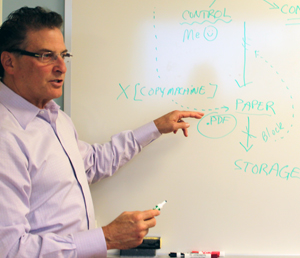Pharmacology & Experimental Therapeutics is Pilot in University-wide Effort to Go Green
The Pharmacology & Experimental Therapeutics department on the Boston University Medical Campus (BUMC) was selected as the pilot for the Green Department Certification initiative through sustainability@BU. This is the first department to achieve 100% Green Office Certification and has already taken considerable steps in changing their collective behavior and administrative activities. David H. Farb, PhD, Professor and Chair of the Department has made waste and energy reduction a top priority for faculty members and staff and expects the department to be certified within the next month.
 David H. Farb
David H. Farb
Modeled after the US Green Building Council’s Leadership in Energy and Environmental Design (LEED) green building rating program, BU’s Green Office Certification program rates individual offices based on four components: energy conservation practices such as lighting and power, communications and activities, waste reduction and recycling. Eliminating paper and paper files, reclaiming paper storage space for productive work, converting to electronic scheduling, and installing smart power strips (surge protectors that turn off power to phantom energy users) are just a few of the improvements the Department has made to their work environment.
 Ink, toner and battery recycling station.
Ink, toner and battery recycling station.
By incentivizing the green transition with a 60-point system, departments at BU can compete via Green Office Certification to receiving certified silver and gold status. Everyday changes, like turning off the lights when leaving a room, drinking from a reusable mug rather than a disposable cup, turning off all electronic devices at the end of the day, using natural light and reducing computer monitor brightness are all proactive steps towards becoming more environmentally conscious.
The Medical Campus’ Facilities Management team plans to make more changes such as converting existing electric motors to high efficiency motors with inverters that reduce electrical currents provided to campus buildings. The installation of dual technology sensors in many of the campus restrooms and extended range occupancy sensor lights in hallways and offices, as well as replacing lobby and exterior lights with Light Emitting-Diode (LED) fixtures are some of the major ways the BUMC is reducing its carbon footprint.
BU’s Sustainability Director, Dennis Carlberg and his team of interns have completed over 200 audits for becoming Green Office Certified. Currently, green lab and dorm certifications are in the works to increase energy efficiency in all aspects of life at BU.
Colleges all over the country are taking on green initiatives. The Princeton Review’s 2011 Guild to 311 Green Colleges, which includes Boston University, recognize the top eco-friendly campuses in the US. As institutions of higher education are becoming more environmentally conscious, other institutions are sure to follow in the challenge to go green.
Submitted by Gina Orlando
View all posts